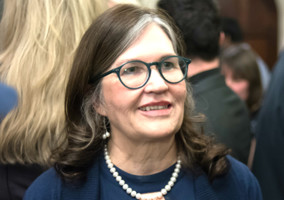Some 59 per cent of charity boards have discussed changing their governance structure in the last year, according to research carried out for NPC.
Charity sector think tank, NPC, published its state of the sector report, Charities taking charge: Transforming to face the changing world, today.
As part of its research it commissioned ComRes to carry out a survey of 300 charity trustees or directors. It also held round tables to discuss issues in depth.
NPC found that chief executives were more likely than trustees to have had discussions changing governance structures, with 69 per cent saying that they had. Among trustees, the figure was 36 per cent.
The think tank also found that some boards are taking more risks, with 43 per cent saying that they have taken more risks than three years ago. Half said they had taken the same amount and just 6 per cent said they had taken fewer.
It suggests that there is a link between board diversity and the ability to manage risk.
“A few people we spoke to identified the importance of having people with different backgrounds, ideas, and perspectives on the board to help understand the wider world, the mission the organisation is there to achieve, and to challenge group think,” the report said.
Charities turning down 'risky' public contracts
More than half of public service delivery charities said they have turned down contracts because the risk is too high or because they are not “on mission”.
Of the 143 charities which deliver public services 57 per cent of charities are walking away from public sector contracts because “the operational risk is too high” and 63 per cent have turned them down because “they are not on mission”.
Nearly two thirds said they had used other sources of income to subsidise delivering public services. 15 per cent said they had “delivered contracts outside of our core mission”.
‘Charities underestimate effect of declining trust’
NPC also warned that while most charities recognised the importance of public trust, they focused on the fundraising aspect.
One in three charities surveyed said that they thought that a fall in public trust would have “no effect” while 28 per cent thought it would reduce fundraising income.
Just 10 per cent argued that public trust had not fallen.
Three quarters of respondents thought that “increasing public understanding of different types of charity” would help and 85 per cent thought being more transparent would help.
NPC recommends that charities “investigate broader models of public engagement, ones that view the public not only as supporters, but in all of their multiple and complex potential roles”. It says charities should “communicate clearly” and “make active attempts to break out of their bubbles of supporters and networks”.
‘Overconfident’ about digital
The report said there is a “limited understanding among charities of what digital and data can achieve” but there is an “overconfidence” in the sector about how advanced the sector’s use is.
NPC said the sector has been slow to “embrace trends” though some are thinking strategically.
Nearly 80 per cent of charities said they were discussing how to use data at board level and 73 per cent had discussed greater use of digital technology.
And 70 per cent were confident that they are making the best use of technology.
But NPC warned that this was not borne out in subsequent questions or in the discussions it had and that there was a “tendency to equate IT and digital” and also that some assumed that “digital transformation is primarily a matter for fundraising and communications teams rather than looking at the potential for service delivery, shared resourcing and transformative approaches”.
NPC said charities should think “more strategically” about digital and “recognise that digital is about a culture of experimentation and collaboration”.
Leaders need to think differently
NPC concluded that the sector needs think differently about how they deliver impact.
Patrick Murray, head of policy and external affairs at NPC, says: “We found some charities thriving through focusing on activities that deliver the greatest impact; collaborating with new and existing partners; embracing diversity and a new attitude to risk; and harnessing new resources, from digital technology to beneficiaries and communities themselves.
“But the research identified many others struggling. If the sector is to step up to the challenge, leaders will need to think very differently about how to deliver impact in this changing world.”
Related articles












